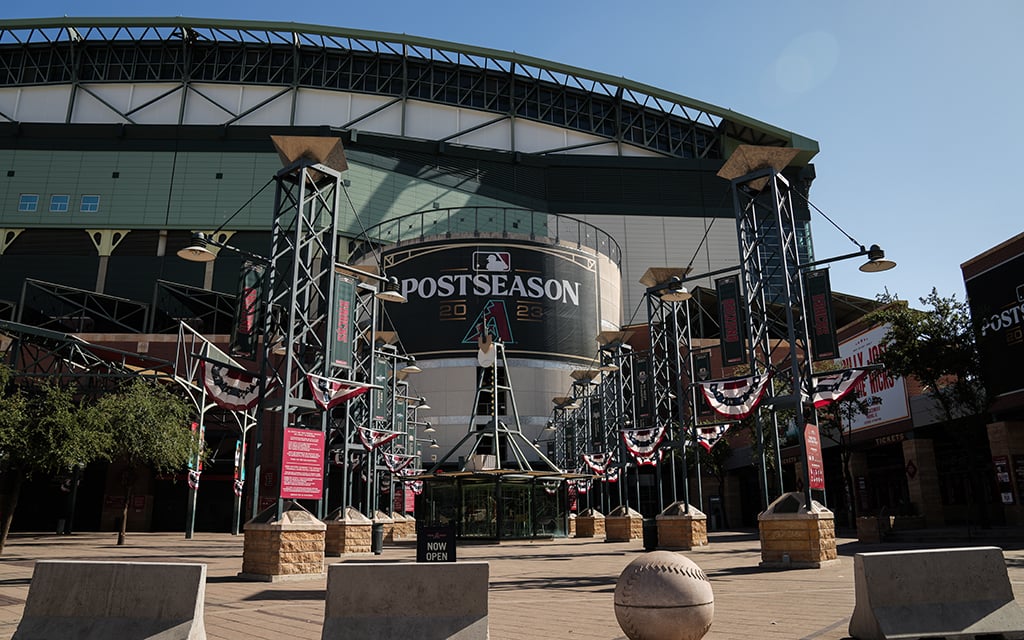PHOENIX – Arizona lawmakers are working on legislation to redistribute tax revenue to the Arizona Diamondbacks, but local officials worry there aren’t enough specifics.
Some legislators are trying to retain the Diamondbacks amid tension between the baseball team and Phoenix over who should pay for Chase Field renovations. The state House passed HB2704, which would reallocate tax dollars toward the stadium, and the Senate first heard it in early March.
Phoenix Mayor Kate Gallego said in an interview with Cronkite News that the bill’s lack of clarity has left the future unclear on whether tax reallocation would go to stadium renovations or aid luxury upgrades.
“I think having caps are important because we have competing priorities, and we should not write unlimited checks,” Gallego said. “We both (Gallego and Gov. Katie Hobbs) want the Diamondbacks to stay in downtown, but we want an open, transparent and accountable process.”
Since its first hearing in the state Senate, the bill has moved through numerous committees and revisions, with its most recent hearing at a March 24 meeting of the Senate Finance Committee.
Rep. Jeff Weninger, R-Chandler, is the sponsor of the bill and said it would keep the Diamondbacks in Arizona.
“I think we came up with a unique way that makes sure that the infrastructure is repaired and kept in good shape,” Weninger said. “It’s about maintaining the team and maintaining the infrastructure.”
The Diamondbacks were established in Arizona in 1998, with the county in charge of stadium upkeep. After a legal dispute over the lease agreement, a 2018 memorandum of understanding made the team “responsible for the operation, management, and maintenance of Chase Field.”
The Diamondbacks’ lease with Maricopa County is set to end in 2027, but proponents of the bill like Luis Gonzalez, a former Diamondbacks player and current senior adviser to the president and CEO of the Diamondbacks, think it should be a high priority to keep the “community asset” around.
“It’s about wanting to stay in the community that we love so much,” Gonzalez said in the March 24 Senate Finance hearing. “There’s a lot of organizations that rely on the Arizona Diamondbacks giving back in this community.”
During his testimony, Gonzalez told members of the committee the Diamondbacks would pay for the required stadium renovations. HB2704 proposed sales and income tax associated with the ballpark and team would be reallocated to the stadium.
Gallego and Maricopa County have opposed the bill over concerns of where the tax dollars would specifically go.
“We really are just trying to make sure it’s very clear who is paying for what,” Gallego said. “I would like it to be clear: What are expenditures that the taxpayers should pay?”
Gallego said the 30-year deal requires more clarity and should hold the Diamondbacks accountable to also pay for stadium upkeep. She also said the current majority owner, Ken Kendrick, 81, is unlikely to see the entirety of the deal play out.
“This is a team owned by a billionaire. He is over 80 years of age. They’re asking for a 30-year deal, but they’re not putting in writing their financial commitment,” Gallego said. “The current owner is very unlikely to be the managing partner at the end of 30 years, when he would be above 110. We ought to put the parameters of the deal in the legislation, and the Diamondbacks should be required to match every dollar of taxpayer funds.”
The bill as it stood at the Senate Finance Committee hearing would commit the Diamondbacks to pay at least $250 million toward stadium renovations, with other money coming from the reallocated taxes from generated sales at Chase Field and employee income taxes – including from players.
The bill has not laid out exactly what the money would pay for, but current repair estimates are between $400-500 million, according to the MLB. Team officials have said numerous infrastructure updates are needed, including HVAC, plumbing, pipes and concrete. The original House bill did not specify which improvements could be made, leading opponents to say there was too much up for interpretation.
“There’s real questions of fairness, and, again, that’s why we need to put parameters on this deal and not make it unlimited,” Gallego said.
The county has sided with the Phoenix mayor over concerns the bill would divert county tax revenue to the stadium fund. Weninger has pushed back against county concerns.
“I believe it’s good for the county – it’s good for the entire state,” Weninger said in the Finance Committee hearing. “This is one step. The county still has to negotiate a lease with the Diamondbacks and that’s not done with this bill. I think they have some leverage there.”
Amendments to HB2704 are expected to be presented to the Senate Appropriations Committee before being heard by the full chamber.
Cronkite News reporter Max Zepeda contributed to this story.



